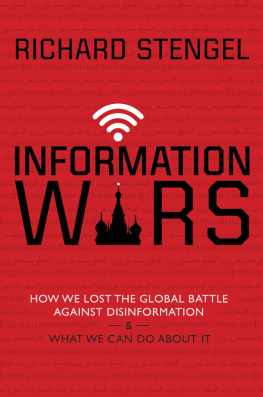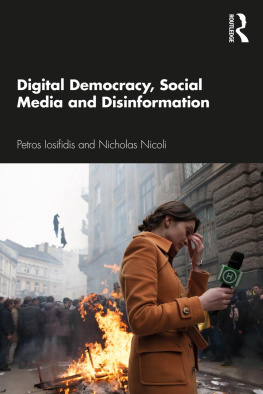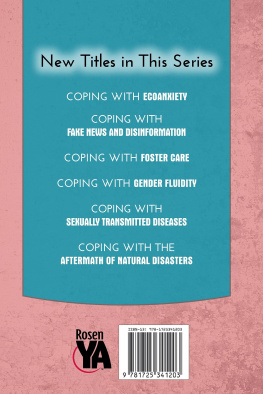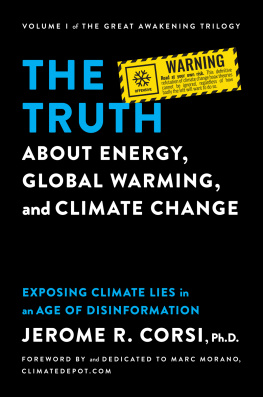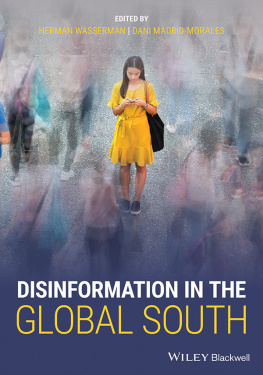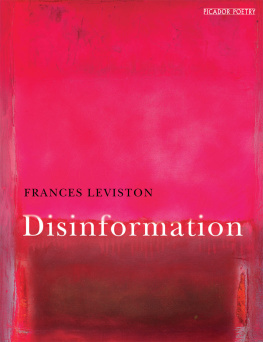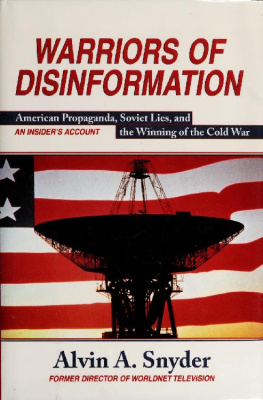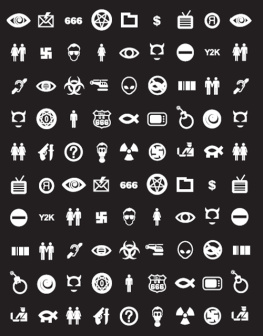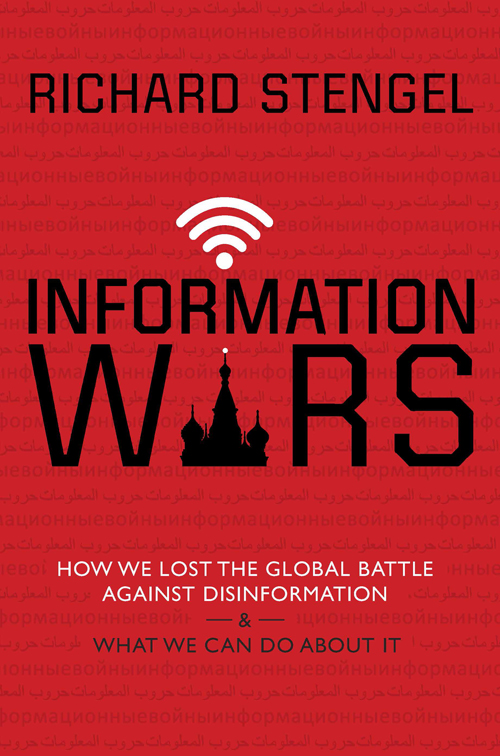Mandelas Way
Youre Too Kind
January Sun
RICHARD STENGEL
HOW WE LOST THE GLOBAL BATTLE AGAINST DISINFORMATION
&
WHAT WE CAN DO ABOUT IT
Copyright 2019 by Richard Stengel
Cover design by D. W. Pine
All rights reserved. No part of this book may be reproduced in any form or by any electronic or mechanical means, including information storage and retrieval systems, without permission in writing from the publisher, except by a reviewer, who may quote brief passages in a review. Scanning, uploading, and electronic distribution of this book or the facilitation of such without the permission of the publisher is prohibited. Please purchase only authorized electronic editions, and do not participate in or encourage electronic piracy of copyrighted materials. Your support of the authors rights is appreciated. Any member of educational institutions wishing to photocopy part or all of the work for classroom use, or anthology, should send inquiries to Grove Atlantic, 154 West 14th Street, New York, NY 10011, or permissions@groveatlantic.com.
FIRST EDITION
Published simultaneously in Canada
First Grove Atlantic edition: October 2019
This book is set in 11.75-pt. Janson Text LT Pro by Alpha Design & Composition of Pittsfield, NH.
Library of Congress Cataloging-in-Publication data available for this title.
ISBN 978-0-8021-4798-1
eISBN 978-0-8021-4799-8
Atlantic Monthly Press
an imprint of Grove Atlantic
154 West 14th Street
New York, NY 10011
Distributed by Publishers Group West
groveatlantic.com
For Mary, Gabriel, and Anton
BBGBroadcasting Board of Governors
CDAThe Communications Decency Act
CNCongressional Notification
CSCCThe Center for Strategic Counterterrorism Communications
CVECountering violent extremism
DCDeputies Committee
DRLDemocracy, Human Rights, and Labor
EAPEast Asian and Pacific Affairs
ECAEducational and Cultural Affairs
EUREuropean and Eurasian Affairs
FLEXFuture Leaders Exchange
GECGlobal Engagement Center
HOffice of Congressional Affairs
IVLPInternational Visitors Leadership Program
JCivilian Security, Democracy, and Human Rights
LLegal Department
NCTCNational Counterterrorism Center
NEANear Eastern Affairs
NSCNational Security Council
PAPublic Affairs
PCPrincipals Committee
PDPPresidents Daily Brief
PUnder Secretary for Political Affairs
RUnder Secretary for Public Diplomacy and Public Affairs
SCASouth and Central Asian Affairs
SSecretary of State
T he first thing you notice when you walk into the White House Situation Room is how cramped and stuffy it is. Theres so little space that if people are already sitting at the table, you have to slowly snake your way in between them like youre taking a seat in the middle of a row in a crowded movie theater. Excuse mePardon meSorry. And try not to bump the National Security Advisor. For some reason, the air-conditioning doesnt work all that well, so it can get pretty fragrant. And unless youre the President of the United States, every guy keeps his suit jacket on and his tie tightened.
It was early in 2014, and it was my first time in the room with President Obama. I was the new Under Secretary of State for Public Diplomacy. He was in shirtsleeves and came in without greeting anyonefocused, intense, all business. I had known President Obama when I was a journalist and had that chummy, jokey rapport with him that journalists and politicians cultivate. But this was a side of him that I had never seen before.
The meeting was about the role of international broadcasting, which was part of my brief at the State Department. International broadcasting meant the legacy organizations that were better known during the Cold War: Voice of America, Radio Free Europe, Radio Liberty. You may not pay attention to them anymore, but they still have a $750 million budgeta nontrivial number even to the federal government. Ben Rhodes, the Presidents deputy national security advisor, sketched out the topic and then called on me. I started to lay out all the traditional stuff that these entities were doing, and I could see the President was impatient. I caught the pass, Rick, he said without a smile. Hmm. In a nanosecond, I pulled back to 30,000 feet and said, well, the real problem was that we were in the middle of a global information war that was going on every minute of the day all around the world and we were losing it.
Then, a different response from the head of the table. Okay, the President said, what do we do about it?
That is the question. There is indeed an information war going on all around the world and its taking place at the speed of light. Governments and non-state actors and individuals are creating and spreading narratives that have nothing to do with reality. Those false and misleading narratives undermine democracy and the ability of free people to make intelligent choices. The audience is anyone with access to a computer or a smartphoneabout four billion people. The players in this conflict are assisted by the big social media platforms, which benefit just as much from the sharing of content that is false as content that is true. Popularity is the measure they care about, not accuracy or truthfulness. Studies show that a majority of Americans can recall seeing at least one false story leading up to the 2016 election. He meant factual information.
Disinformation is as old as humanity. When the serpent told Eve that nothing would happen if she ate the apple, that was disinformation. But today, spreading lies has never been easier. On social media, there are no barriers to entry and there are no gatekeepers. There is no fact-checking, no editors, no publishers; you are your own publisher. Anyone can sign up for Facebook or Twitter and create any number of personas, which is what troll armies do. These trolls use the same behavioral and information tools supplied by Facebook and Google and Twitter to put poison on those platforms and reach a targeted, receptive audience. And its just as easy to share something false as something thats factual.
One reason for the rise in global disinformation is that waging an information war is a lot cheaper than buying tanks and Tridents, and the return on investment is higher. Today, the selfie is mightier than the sword. It is asymmetric warfare requiring only computers and smartphones and an army of trolls and bots. You dont even have to win; you succeed if you simply muddy the waters. Its far easier to create confusion than clarity. There is no information dominance in an information war. There is no unipolar information superpower. These days, offensive technologies are cheaper and more effective than defensive ones. Information war works for small powers against large ones, and large powers against small ones; it works for states and for non-state actorsits the great leveler. Not everyone can afford an F-35, but anyone can launch a tweet.
Why does disinformation work? Well, disinformation almost always hits its target because the targetyou, me, everyonerises up to meet it. We ask for it. Social scientists call this confirmation bias. We seek out information that confirms our beliefs. Disinformation sticks because it fits into our mental map of how the world works. The internet is the greatest delivery system for confirmation bias in history.

